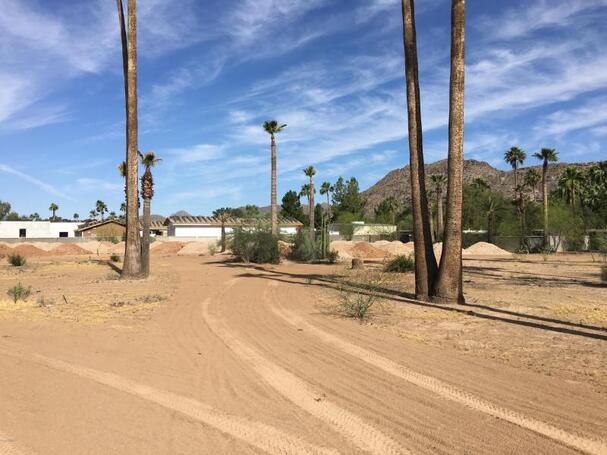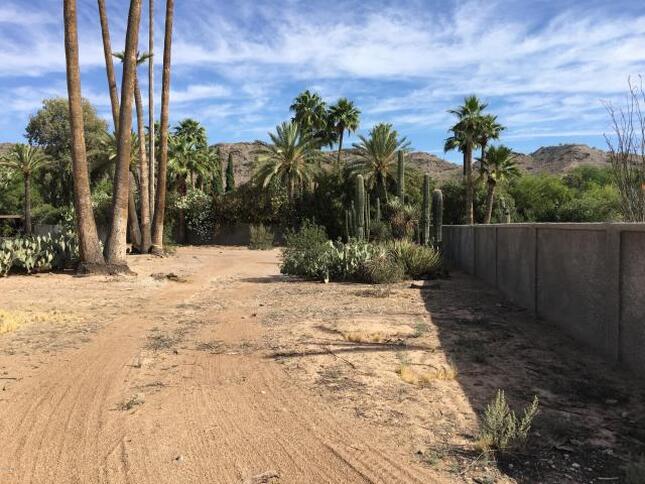Helpful Tips For New Home or Land Buyers
Property Buyer's Checklist From The Arizona Department of Real Estate (ADRE)
Here is a checklist of helpful hints for property buyer's to help avoid some of the pitfalls of purchasing a new or used home, or raw, undeveloped land.

PREVIOUSLY OWNED HOMES:
1. Be aware that the seller's broker does not represent you; the seller's broker represents the seller. The seller's broker has certain responsibilities to the seller that are not afforded to you. You might wish to retain the services of a buyer's broker to represent you in the transaction. Usually, the buyer's broker receives a portion of the commission paid by the seller, and the services may cost you nothing, but you will receive representation equal to that provided to the seller by the seller's broker.
2. Read the seller's property disclosure report and check every item on it. Ask to see receipts for repairs to the home. Look behind large pictures on the wall and behind anything on the floor which conceals large areas of the wall. Look for stains on the ceilings or carpets that might indicate water damage. Read the purchase contract carefully to determine if there are any deadlines for challenging the seller's disclosure report or for having your own inspections conducted.
1. Be aware that the seller's broker does not represent you; the seller's broker represents the seller. The seller's broker has certain responsibilities to the seller that are not afforded to you. You might wish to retain the services of a buyer's broker to represent you in the transaction. Usually, the buyer's broker receives a portion of the commission paid by the seller, and the services may cost you nothing, but you will receive representation equal to that provided to the seller by the seller's broker.
2. Read the seller's property disclosure report and check every item on it. Ask to see receipts for repairs to the home. Look behind large pictures on the wall and behind anything on the floor which conceals large areas of the wall. Look for stains on the ceilings or carpets that might indicate water damage. Read the purchase contract carefully to determine if there are any deadlines for challenging the seller's disclosure report or for having your own inspections conducted.
3. Order your own termite inspection. It will cost about $30. Don't rely on a termite inspection obtained by the seller. Some sellers have been known to cover up termite infestation by having several inspections done until they obtain a report that shows no infestation.
4. Consider having the home inspected by a professional home inspector. It will cost perhaps $200 or $300. It is money well spent. For instance, the owner may not know that the roof is rotten and must be replaced. If any alterations have been made to the home -- the addition of an Arizona room, for instance -- ask to see the building permit. Make sure the alterations are legal. Home inspectors are not currently licensed or regulated by the State (they will be some time in 2002), but your buyer's broker may be able to recommend a reliable home inspector.
4. Consider having the home inspected by a professional home inspector. It will cost perhaps $200 or $300. It is money well spent. For instance, the owner may not know that the roof is rotten and must be replaced. If any alterations have been made to the home -- the addition of an Arizona room, for instance -- ask to see the building permit. Make sure the alterations are legal. Home inspectors are not currently licensed or regulated by the State (they will be some time in 2002), but your buyer's broker may be able to recommend a reliable home inspector.

5. Check all appliances to confirm that they work, including the stove burners, oven, garbage disposal, dishwasher, washer and dryer and the water heater.
6. Run water in all sinks and tubs and flush the toilets to make sure they drain properly. If the landscaping includes an irrigation system, check to see that it works.
7. Drive around the neighborhood and observe the condition of the homes. Are lawns mowed? Are there old cars rusting in driveways? Ask neighbors how they like living in the area. Is this really where you want to live?
8. Read steps 3, 4, 5 and 6 for "New Homes in a Subdivision" above.
6. Run water in all sinks and tubs and flush the toilets to make sure they drain properly. If the landscaping includes an irrigation system, check to see that it works.
7. Drive around the neighborhood and observe the condition of the homes. Are lawns mowed? Are there old cars rusting in driveways? Ask neighbors how they like living in the area. Is this really where you want to live?
8. Read steps 3, 4, 5 and 6 for "New Homes in a Subdivision" above.
NEW HOMES IN A SUBDIVISION:
1. You should read the Arizona Department of Real Estate Public Report. By law, this document must be given to you before you sign the purchase contract. You must sign a receipt for the Report. By signing the receipt, you imply that you have read the report. The Public Report will tell you such things as:
If you have any questions about the Public Report, you are welcome to call the Arizona Department of Real Estate at 602-468-1414, extension 400. A Subdivision Representative will assist you with your questions. The cover sheet of the Public Report contains a disclaimer by the Department of Real Estate. Read it carefully. Most important, note that it states:
1. You should read the Arizona Department of Real Estate Public Report. By law, this document must be given to you before you sign the purchase contract. You must sign a receipt for the Report. By signing the receipt, you imply that you have read the report. The Public Report will tell you such things as:
- Flooding and drainage disclosure
- A description of adjacent land and uses
- Who provides electricity, telephone, gas, water and sewage disposal
- Common community and recreation facilities
- Assurances for completion of improvements
- Local services and facilities, including schools, shopping facilities, public transportation, medical facilities, fire protection, ambulance service, police protection and garbage services.
- Taxes and assessments
- Property owners association details
If you have any questions about the Public Report, you are welcome to call the Arizona Department of Real Estate at 602-468-1414, extension 400. A Subdivision Representative will assist you with your questions. The cover sheet of the Public Report contains a disclaimer by the Department of Real Estate. Read it carefully. Most important, note that it states:
|
"Not all of the information in this report has been verified by the Department; certain information has been accepted by the Department as true and accurate based on attestation of the sub-divider and/or the sub-divider's agents. You should verify all facts before signing any documents." |
2. Read the purchase contract carefully. Note that if the builder or developer is not placing your earnest money deposit in escrow, the funds may be placed in the builder's or developer's general funds account and may be used for any purpose. You could lose the money if the builder or developer declares bankruptcy or otherwise goes out of business. If the funds are not going to be placed in escrow, that fact must be stated in a separate paragraph in the purchase contract, and you are required to initial that paragraph. Make sure you understand where your earnest money is going to be deposited.

3. Before you sign a purchase contract, drive around the home for at least a mile or more in every direction to see how the surrounding area appears to you and what land use of safety issues exist in the area. Is there a storm drain or canal nearby that might pose a hazard to your children? Is the home or building site near an airport or a manufacturing plant? Visit the area at different times of day, on weekends and in the evening. Disturbing noises and odors can travel farther at night.
In areas where there are expanses of vacant land nearby, check city or county zoning maps to see if nearby property is zoned for apartments, industrial or commercial use. Land zoned for commercial use might be
In areas where there are expanses of vacant land nearby, check city or county zoning maps to see if nearby property is zoned for apartments, industrial or commercial use. Land zoned for commercial use might be
used to construct anything from a shopping center to a hotel. To obtain this information, call the city or county planning and zoning department listed in your telephone directory.
Check Arizona Department of Transportation maps to find the nearest future freeway routes, and whether roads in the area are slated for widening. For information about reviewing the maps, call 602-255-7011.
4. Call the school district serving the subdivision to determine whether nearby schools are accepting new students. Some school districts have placed a cap on enrollment. You may find that your children cannot attend the school nearest you and may even be transported to another community.
5. Read the deed restrictions, also called CC&Rs (covenants, conditions and restrictions). You might find some of the CC&Rs are very strict, especially those addressing landscaping, RV parking, play equipment, satellite antennas, and other common amenities -- particularly if the subdivision is governed by a homeowner's association.
6. Check out the home builder with the Arizona Registrar of Contractors. You can determine the number of complaints customers have filed against the contractor, whether any are unresolved and whether the builder's license has ever been suspended or revoked. You may reach the Registrar of Contractors at 602/542-1525.
Check Arizona Department of Transportation maps to find the nearest future freeway routes, and whether roads in the area are slated for widening. For information about reviewing the maps, call 602-255-7011.
4. Call the school district serving the subdivision to determine whether nearby schools are accepting new students. Some school districts have placed a cap on enrollment. You may find that your children cannot attend the school nearest you and may even be transported to another community.
5. Read the deed restrictions, also called CC&Rs (covenants, conditions and restrictions). You might find some of the CC&Rs are very strict, especially those addressing landscaping, RV parking, play equipment, satellite antennas, and other common amenities -- particularly if the subdivision is governed by a homeowner's association.
6. Check out the home builder with the Arizona Registrar of Contractors. You can determine the number of complaints customers have filed against the contractor, whether any are unresolved and whether the builder's license has ever been suspended or revoked. You may reach the Registrar of Contractors at 602/542-1525.

Raw Undeveloped Land:
1. Ask to see the Arizona Department of Real Estate Public Report before you sign anything. The contents of the Report are described above in "New Homes in a Subdivision" above. Pay particular attention to the source of utility services. You may find that bringing utilities to the property will be an expensive proposition. If the property you are considering is smaller than 160 acres, if there are more than five parcels in the subdivision, and if the developer cannot produce a Public Report, the subdivision is probably illegal. If you buy the land without reading a Public Report, you may find there is no supply of water, or that it will cost tens of thousands of dollars to bring electric service to the property. You may also find that you do not have permanent legal access to your property.
2. Ask to see the Arizona Department of Water Resources report for the property. Determine that there is an assured or adequate water supply (depending on whether the property is in or outside of a Groundwater Active Management Area), and how much it will cost to have a well dug if necessary.
1. Ask to see the Arizona Department of Real Estate Public Report before you sign anything. The contents of the Report are described above in "New Homes in a Subdivision" above. Pay particular attention to the source of utility services. You may find that bringing utilities to the property will be an expensive proposition. If the property you are considering is smaller than 160 acres, if there are more than five parcels in the subdivision, and if the developer cannot produce a Public Report, the subdivision is probably illegal. If you buy the land without reading a Public Report, you may find there is no supply of water, or that it will cost tens of thousands of dollars to bring electric service to the property. You may also find that you do not have permanent legal access to your property.
2. Ask to see the Arizona Department of Water Resources report for the property. Determine that there is an assured or adequate water supply (depending on whether the property is in or outside of a Groundwater Active Management Area), and how much it will cost to have a well dug if necessary.

3. If purchasing raw land with the intent to develop it into smaller parcels, be aware that splitting the land into more than five parcels requires a Subdivision Public Report issued by the Arizona Department of Real Estate. For more information about applying for the report and the cost, contact the Department at 602-468-1414, extension 400.
4. If you have inspected the land and signed a purchase agreement or contract, you have seven calendar days following the day on which you signed the agreement or contract to rescind the purchase in writing without cause. The rescission notice must be received by the seller by midnight of the seventh calendar day. The seller must clearly and conspicuously disclose your right to rescind the purchase. Right of rescission does not apply to new or previously owned homes.
5. If you have not inspected the land before signing a purchase agreement or contract, you have six months in which to inspect the land, and at the time of the inspection you have the right to rescind the purchase.
4. If you have inspected the land and signed a purchase agreement or contract, you have seven calendar days following the day on which you signed the agreement or contract to rescind the purchase in writing without cause. The rescission notice must be received by the seller by midnight of the seventh calendar day. The seller must clearly and conspicuously disclose your right to rescind the purchase. Right of rescission does not apply to new or previously owned homes.
5. If you have not inspected the land before signing a purchase agreement or contract, you have six months in which to inspect the land, and at the time of the inspection you have the right to rescind the purchase.

